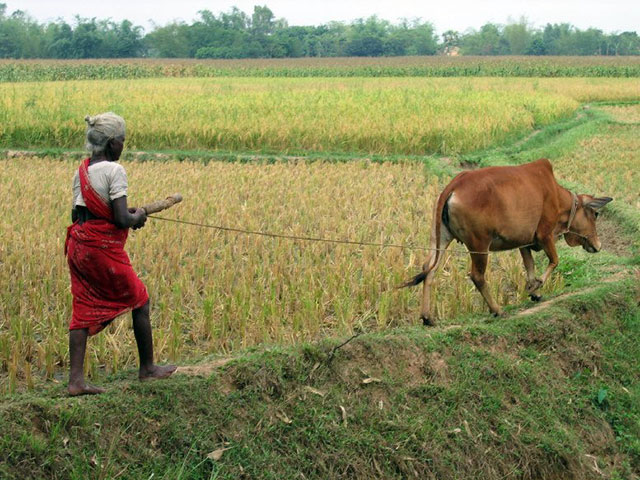
Honest, paywall-free news is rare. Please support our boldly independent journalism with a donation of any size.
Industrial agriculture and financial sectors are hand-in-hand worsening climate change and then profiting from it, with an unprecedented number of land grabs over the last eight years, according to a report released Tuesday.
The campaign group GRAIN explained that land grabs are heightening food insecurity, entrenching corporate agriculture schemes, and increasing and intensifying land conflicts.
The wave of global land grabs borne out of the 2008 food and financial crises has now reached tsunami proportions, as GRAIN’s research shows that the number of land grab initiatives has ballooned from 100 in 2008 to 491 in 2016, spanning 78 countries across the globe with large concentrations in Africa, and to a lesser extent in Latin America, East Asia and the Pacific.
And climate change is compounding the situation.
“We now have even more evidence that climate change is caused not just by burning coal and oil for transport and energy, but by the industrial food system itself and the corporate quest for profits that drives its expansion,” the report states. “Indeed, climate change and land grabs are inextricably linked.”
The people suffering the brunt of this are small-scale farmers, pastoralists, and Indigenous communities, who are displaced by multinational corporations and financial investors scrambling for arable lands and water resources.
According to Kartini Samon, a GRAIN researcher from Indonesia, land grabs are also a form of neocolonialism.
“If we reflect on the old style of colonialism … (it) is really about extracting natural resources and cheap labor; expanding plantations in colonial lands like the case in Indonesia,” Samon told teleSUR. “The pattern is the same now, but using different strategies either through trade and investment agreements or implementing laws that legalize the process to happen.”
The Trans-Pacific Partnership, or TPP, for instance, is a trade agreement on the verge of passage spearheaded by the United States that includes 11 Pacific Rim countries that encompass almost half of the global economy. It facilitates export-oriented industrial agriculture and allows corporations to sue governments over public interest laws that could cover anything from land to labor and environmental policies. And the TPP is just part of a decades-long legacy of free trade agreements perpetuating this pattern that Samon mentioned, starting in 1994 with the passage of the North American Free Trade Agreement, which has served largely as a model for all the trade deals that came after it. These same principles are also championed by international financial institutions such as the World Bank and International Monetary Fund.
According to the GRAIN report, policy makers and corporate board rooms are trying to mask these destructive land deals in the language of “corporate social responsibility,” through voluntary “frameworks” and “guidelines” to minimize social and environmental costs.
“Yes, the language has been used to greenwash new land grabs,” said Samon. “Both politically and in practice, it rarely works to the advantage of local communities. Rather, it creates a mirage of accountability … these so-called responsible investment schemes or corporate social responsibility is nothing more than a public relations exercise.”
Violent land conflicts are another component of the past decade’s land grabbing phenomenon, which are hard to mask.
“The major issue for us comparing 2008 to now is that now we have seen so many conflicts erupt, people have died and people have been arrested,” Devlin Kuyek, a Canada-based GRAIN researcher, told teleSUR.
Kuyek said that this has a lot to do with the fact that now these deals have gone from being signed agreements to actually being implemented.
His colleague Samon agreed.
“In recent years we see how there’s growing repression and human rights violations happening to grassroots resistance and land defenders,” she said. “From Cambodia to Cameroon, from Indonesia to Ivory Coast, we see increasing threats and the use of violence to repress communities fighting back.”
But amid the violence, poverty and desperation caused by these land grabs, grassroots resistance is growing.
“There is more of a convergence of peasant movements, farmer organizations and of larger civil society movements recognizing the major issue here, and that is it’s a structural change that is required,” said Kuyek.
He added that because the policy making process is “so captured by corporate interests,” social movement organizing may be the best, if not last hope, to reversing, or even curbing the land grabbing scourge.
“The issue is about the transformation of power and you see the social movements that are active in agriculture and active on land issues understand that it’s about social transformation and I think where there’s a promise for change and where social movements have their strength is that sort of convergence of struggles,” said Kuyek.
Holding Trump accountable for his illegal war on Iran
The devastating American and Israeli attacks have killed hundreds of Iranians, and the death toll continues to rise.
As independent media, what we do next matters a lot. It’s up to us to report the truth, demand accountability, and reckon with the consequences of U.S. militarism at this cataclysmic historical moment.
Trump may be an authoritarian, but he is not entirely invulnerable, nor are the elected officials who have given him pass after pass. We cannot let him believe for a second longer that he can get away with something this wildly illegal or recklessly dangerous without accountability.
We ask for your support as we carry out our media resistance to unchecked militarism. Please make a tax-deductible one-time or monthly donation to Truthout.